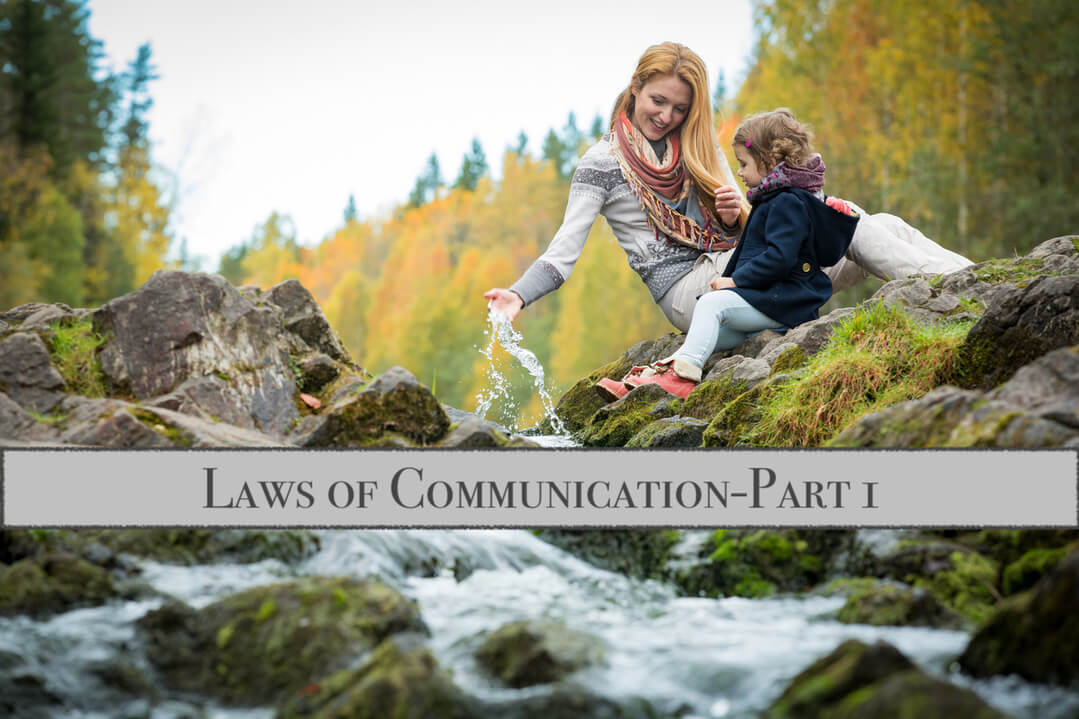Laws of Communication – Part 1
Laws of Communication – Part 1
Do you ever feel like your kids never get what you’re trying to teach them? Are you frustrated because you keep telling them what’s right and what’s wrong but they keep doing the wrong thing? If you’re a minister, do you feel like your congregation keeps going in circles and you can’t seem to get them to grasp and put into practice what you’re teaching?
If you are a parent, a teacher, a minister, or if you desire to be a better communicator, then this series is for you. As a father of six daughters and a pastor/teacher I have learned a thing or two about what to do and what not to do in trying to communicate your thoughts to your kids, students, employees, congregants, and even bystanders. In this series we will tackle some important laws of communication to hopefully lead you to being a better spouse, parent, and teacher. These laws aren’t new, but they are powerful and I believe they will impact your life as they have, over the years, impacted mine. So let’s get started!

The number one law of being a good communicator is this: If you stop learning today, you will stop teaching tomorrow. For some reason, many people believe there comes a point at which they’re no longer the student. This results in a stale life and a cesspool of stagnant water. And if you call yourself a teacher (and everyone is to some degree), then that means that there are people who are drinking from whatever your water source is.
In order to be an effective teacher, you must first be an effective student, always learning and always changing yourself. You want a constant freshwater spring flowing through your life, a spring from which others can drink. If you want to minister to others, you must allow God to minister to you. And oftentimes the best way to get fresh water into your parched earth of life is to drill through the hard heart and stubborn mind of your soul. Most of the time, Yahweh uses trials and tribulations to dig wells that bring about powerful new teaching material that can radically change someone’s life. These tribulations are what most of us run from without realizing the impact that can be had when God uses His drill to hit the depth of His Word in our lives. You cannot teach someone something if you do not fully believe in and understand it yourself.
Theological professor and author Dr. Howard Hendricks said that a good teacher is “FAT”: Faithful, Available, and Teachable. He must first be faithful to the call, trustworthy in his integrity, and loyal in his relationships, especially his relationship with his Teacher, the Holy Spirit. How can a teacher have any credibility if he doesn’t have the integrity to back up what he’s saying? How can a parent tell his children that cussing is wrong but then use profanity every now and then? How can a minister teach that giving is important to the growth of the kingdom message but then not be a giver himself? The student must be able to trust his teacher and this starts with being faithful to Christ.
Next, he must be available. He cannot just be a teacher who teaches and then comes off the stage, never to be seen again. He must make himself available to the student so that the student has a place to go to ask follow-up questions, get further clarity, and make sure he understands exactly what’s being taught. If you’re a parent, this means you must get down on your kids’ levels and speak things in their language. All too often Cheryl and I see parents yell at kids and use adult terms to instruct them, leaving the children no clue as to what the adult is talking about. All they know is mom and dad are really mad.
For example, let’s say a parent sees his 14-year-old son constantly being taken advantage of, is tired of him being naïve, and decides to yell at him. What happens if his son has no idea what the word “naïve” means? If a parent is going to try to teach a child something, he must make sure there is two-way communication so that the child understands what is being communicated. This also means that the “teacher” must create an atmosphere where the “student” feels comfortable enough to ask questions without being mocked. The atmosphere is critical at every teaching level.
Lastly, the teacher needs to be teachable. In other words, he must be a good student himself, willing to learn from every situation in which he finds himself, even from the students he’s attempting to teach. This is what creates growth. The more the teacher grows the more he has to offer the student in his growth. I can’t tell you how much I have learned not only from my own kids but also from those I’ve ministered to.
The Scriptures say that Yeshua grew in wisdom, stature, favor with God, and favor with men. In the same way as the great Teacher, we teachers also need to grow in those four areas. Wisdom comes not only from the knowledge of the Word of God but also from its practical application. This means that we parents/teachers/ministers sometimes need to come down from our theological ivory towers and mix with people exactly as Christ did. His effectiveness came in part because He lived with his students. He was there to share His knowledge, not from a theological creedal perspective, but from real-life situations. This is what allowed Him to grow in stature with both God and with men. He did not spend His time with the other teachers but with His students. His teaching was not confined to the temple grounds but to farms, streams, rivers, and late-night dinner discussions.
Parents, this means you need to get to know your kids on their level. Find out what’s important to them and use those things to teach them spiritual principles. For example, if your daughter loves horses, you could teach her that the horse is like the Word of God. It’s strong enough to carry you when you’re weak, and if you learn how to ride it well, it can help you do things you could never do in your own strength. Find things in their world and use them to teach them about their Creator. Yeshua was a master at this.
People do what they believe and only believe the things they know. This means that to be a successful parent or minister of truth, you must continue learning yourself. The only parenting skills that parents typically have is what they learned from their own parents. And some grow up with parents who weren’t exactly the best role models, even if they had the best intentions. All of us were dealt the hand we were dealt. This means that if we want our children to be raised “in the way they should go,” we need to educate ourselves on what that looks like. Parents can read books, watch videos, and talk with parents they respect in their communities in order to reach their full potential as a parent. This will allow their children to reach their full potential in Christ. You must read to lead and all leaders read.
In the end, the greatest threat to a good teacher, pastor, or parent is satisfaction. We can never be satisfied. We must always ask ourselves, “How can I improve?” We should consistently evaluate ourselves and ask ourselves three questions: 1) What are my strengths? 2) What are my weaknesses? and 3) What do I need to change? A good teacher will stay teachable and will always seek to improve themselves because they understand that improving themselves will automatically lead to improving their students. Every person who is teaching someone has the responsibility to make sure they are the best communicator and teacher they can possibly be. And that starts with learning ourselves. I once made the mistake of thinking I was a pretty good teacher and leader. Years and scores of books later, I realized just how much I was leaving on the table. Pick up a book on parenting. Watch a video or read something on leadership. Inspiration wards off desperation and leads to a godly nation. But it starts with you the teacher.
Shalom,
Jim Staley
April 2018












